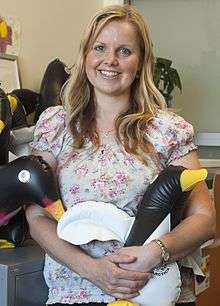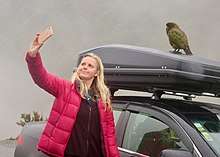Victoria Metcalf
Victoria Metcalf is an Antarctic researcher based in New Zealand, best known for her work on Antarctic fishes and invertebrates. She was awarded the 2006 Zonta Prize.
Victoria Metcalf | |
|---|---|
 | |
| Nationality | New Zealand |
| Alma mater | University of Otago |
| Scientific career | |
| Fields | Polar biology |
| Institutions | Lincoln University |
| Influences | Father: Lawrie Metcalf |
Early life and education
Victoria Metcalf was born in Christchurch, New Zealand, then moved to Invercargill when she was 4. She graduated in 1996 with BSc(Hons) First Class in Biochemistry, University of Otago. In 2002 she completed her PhD in Biochemistry at Christchurch School of Medicine, University of Otago.
Career and impact
Victoria Metcalf is a marine biologist, geneticist, science communicator and lecturer at Lincoln University in New Zealand. She is currently the National Coordinator of the Participatory Science Platform, Office of the Prime Minister's Chief Science Advisor. Metcalf’s research focused on fish and shellfish, mainly Antarctic marine life although this extends in some cases to New Zealand marine species.[1][2]
Metcalf has made seven trips to the Antarctic and has been researching Antarctic fish and invertebrates since 1998. Metcalf also has interest in New Zealand aquaculture species. She is researching how key species have adapted to their environment and the potential impacts of warming temperatures, ocean acidification and pollution.[3]

Metcalf has a role in the Office of the Prime Minister’s Chief Science Advisor as National Coordinator for their flagship initiative, the Participatory Science Platform.[4][5] This initiative seeks to engage communities and scientists to work together on locally meaningful projects, including those involving Citizen Science.
Awards and honours
Metcalf was awarded the 2006 Zonta Prize for Women in Science.[6]
References
- "Dr. Victoria Metcalf". www.sci21.co.nz. Retrieved 2016-06-20.
- "Victoria Metcalf". biotechlearn.org.nz. Biotech Learning Hub. Retrieved 2016-06-20.
- "Extraordinary Kiwis - Clarke in Antarctica". www.nzonscreen.com. NZ On Screen. Retrieved 2016-06-20.
- "Extreme citizen science in New Zealand". www.curiousminds.nz. Curious Minds. Retrieved 2016-06-18.
- "Connecting communities with science". nz.educationhq.com. EducationHQ New Zealand. Retrieved 2016-06-20.
- "Previous Science Award Recipients". zontascience.org.nz. Zonta Club of Wellington. Retrieved 2016-06-18.
External links
- http://sciblogs.co.nz/author/icedoctor/
- Victoria Metcalf publications indexed by Google Scholar